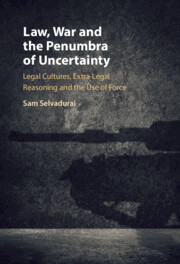Book contents
- Praise for Law, War and the Penumbra of Uncertainty
- Law, War and the Penumbra of Uncertainty
- Law, War and the Penumbra of Uncertainty
- Copyright page
- Contents
- Figures
- Acknowledgements
- 1 Introduction
- Part I Varieties of Uncertainty in the Jus Ad Bellum
- Part II The International Court of Justice, UK-Based Lawyers and the Jus Ad Bellum
- 4 Competing Interpretive Cultures of War
- 5 Competing Strategic Cultures of Law
- Part III Managing Uncertainty: Reconciling Legal and Extra-legal Reasoning
- Bibliography
- Index
4 - Competing Interpretive Cultures of War
from Part II - The International Court of Justice, UK-Based Lawyers and the Jus Ad Bellum
Published online by Cambridge University Press: 31 March 2022
- Praise for Law, War and the Penumbra of Uncertainty
- Law, War and the Penumbra of Uncertainty
- Law, War and the Penumbra of Uncertainty
- Copyright page
- Contents
- Figures
- Acknowledgements
- 1 Introduction
- Part I Varieties of Uncertainty in the Jus Ad Bellum
- Part II The International Court of Justice, UK-Based Lawyers and the Jus Ad Bellum
- 4 Competing Interpretive Cultures of War
- 5 Competing Strategic Cultures of Law
- Part III Managing Uncertainty: Reconciling Legal and Extra-legal Reasoning
- Bibliography
- Index
Summary
Chapter 4 considers evidence that disagreements about the jus ad bellum are linked to disagreements between ‘formalist’ and ‘dynamist’ legal cultures. The chapter describes legal interpretation techniques identified in analysis of UK government statements and writings by eight legal scholars about the lawfulness of military action in Kosovo (1999), Afghanistan (2001) and Iraq (2003), judges’ opinions in the key ICJ cases Nicaragua (1986), Wall (2004) and Congo (2005), and in interviews and a survey with thirty-one UK-based international lawyers. The analysis suggests the jus ad bellum displays the forms of vagueness already identified: paradigms, supervaluationism, and fuzzy logic. Lawyers’ legal interpretive choices broadly aligned with their views on the lawfulness of force, on a continuum between a formalist legal culture aligning with a restrictive approach to the jus ad bellum, and a dynamist culture aligning with an expansionist approach. But the correlation has caveats: expansionist lawyers sometimes deployed formalist arguments, while restrictivist lawyers sometimes deployed dynamist arguments. Competing interpretation techniques also do not explain lawyers’ differing factual assessments and forecasts about the jus ad bellum.
Keywords
- Type
- Chapter
- Information
- Law, War and the Penumbra of UncertaintyLegal Cultures, Extra-legal Reasoning and the Use of Force, pp. 113 - 160Publisher: Cambridge University PressPrint publication year: 2022

